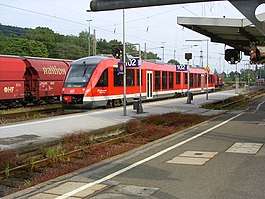Brunswick Southern Railway
The Brunswick Southern Railway (German: Braunschweigische Südbahn) was built by the Duchy of Brunswick State Railway as a link from its Brunswick–Bad Harzburg railway to the Hanoverian Southern Railway. It ran through the northwestern Harz Foreland from Börßum via Salzgitter, Ringelheim and Seesen to Kreiensen. It opened on 5 August 1856 and was one of the oldest railways in Germany.
| Brunswick Southern Railway | |||||||||||||||||||||||||||||||||||||||||||||||||||||||||||||||||||||||||||||||||||||||||||||||||||||||||||||||||||||||||||||||||||||||||||||||||||||||||||||||||||||||||||||||||||||||||||||||||||||||||||||||||||||||||||||||||||||||||||||||||||||||||||||||||||||||||||||
|---|---|---|---|---|---|---|---|---|---|---|---|---|---|---|---|---|---|---|---|---|---|---|---|---|---|---|---|---|---|---|---|---|---|---|---|---|---|---|---|---|---|---|---|---|---|---|---|---|---|---|---|---|---|---|---|---|---|---|---|---|---|---|---|---|---|---|---|---|---|---|---|---|---|---|---|---|---|---|---|---|---|---|---|---|---|---|---|---|---|---|---|---|---|---|---|---|---|---|---|---|---|---|---|---|---|---|---|---|---|---|---|---|---|---|---|---|---|---|---|---|---|---|---|---|---|---|---|---|---|---|---|---|---|---|---|---|---|---|---|---|---|---|---|---|---|---|---|---|---|---|---|---|---|---|---|---|---|---|---|---|---|---|---|---|---|---|---|---|---|---|---|---|---|---|---|---|---|---|---|---|---|---|---|---|---|---|---|---|---|---|---|---|---|---|---|---|---|---|---|---|---|---|---|---|---|---|---|---|---|---|---|---|---|---|---|---|---|---|---|---|---|---|---|---|---|---|---|---|---|---|---|---|---|---|---|---|---|---|---|---|---|---|---|---|---|---|---|---|---|---|---|---|---|---|---|---|---|---|---|---|---|---|---|---|---|---|---|---|---|
 | |||||||||||||||||||||||||||||||||||||||||||||||||||||||||||||||||||||||||||||||||||||||||||||||||||||||||||||||||||||||||||||||||||||||||||||||||||||||||||||||||||||||||||||||||||||||||||||||||||||||||||||||||||||||||||||||||||||||||||||||||||||||||||||||||||||||||||||
| Overview | |||||||||||||||||||||||||||||||||||||||||||||||||||||||||||||||||||||||||||||||||||||||||||||||||||||||||||||||||||||||||||||||||||||||||||||||||||||||||||||||||||||||||||||||||||||||||||||||||||||||||||||||||||||||||||||||||||||||||||||||||||||||||||||||||||||||||||||
| Native name | Braunschweigische Südbahn | ||||||||||||||||||||||||||||||||||||||||||||||||||||||||||||||||||||||||||||||||||||||||||||||||||||||||||||||||||||||||||||||||||||||||||||||||||||||||||||||||||||||||||||||||||||||||||||||||||||||||||||||||||||||||||||||||||||||||||||||||||||||||||||||||||||||||||||
| Locale | Lower Saxony, Germany | ||||||||||||||||||||||||||||||||||||||||||||||||||||||||||||||||||||||||||||||||||||||||||||||||||||||||||||||||||||||||||||||||||||||||||||||||||||||||||||||||||||||||||||||||||||||||||||||||||||||||||||||||||||||||||||||||||||||||||||||||||||||||||||||||||||||||||||
| Termini | Börßum Kreiensen | ||||||||||||||||||||||||||||||||||||||||||||||||||||||||||||||||||||||||||||||||||||||||||||||||||||||||||||||||||||||||||||||||||||||||||||||||||||||||||||||||||||||||||||||||||||||||||||||||||||||||||||||||||||||||||||||||||||||||||||||||||||||||||||||||||||||||||||
| Line number | 1940 | ||||||||||||||||||||||||||||||||||||||||||||||||||||||||||||||||||||||||||||||||||||||||||||||||||||||||||||||||||||||||||||||||||||||||||||||||||||||||||||||||||||||||||||||||||||||||||||||||||||||||||||||||||||||||||||||||||||||||||||||||||||||||||||||||||||||||||||
| Technical | |||||||||||||||||||||||||||||||||||||||||||||||||||||||||||||||||||||||||||||||||||||||||||||||||||||||||||||||||||||||||||||||||||||||||||||||||||||||||||||||||||||||||||||||||||||||||||||||||||||||||||||||||||||||||||||||||||||||||||||||||||||||||||||||||||||||||||||
| Line length | 67.4 km (41.9 mi) | ||||||||||||||||||||||||||||||||||||||||||||||||||||||||||||||||||||||||||||||||||||||||||||||||||||||||||||||||||||||||||||||||||||||||||||||||||||||||||||||||||||||||||||||||||||||||||||||||||||||||||||||||||||||||||||||||||||||||||||||||||||||||||||||||||||||||||||
| Number of tracks | 2 between Salzgitter Bad and Kreiensen | ||||||||||||||||||||||||||||||||||||||||||||||||||||||||||||||||||||||||||||||||||||||||||||||||||||||||||||||||||||||||||||||||||||||||||||||||||||||||||||||||||||||||||||||||||||||||||||||||||||||||||||||||||||||||||||||||||||||||||||||||||||||||||||||||||||||||||||
| Track gauge | 1,435 mm (4 ft 8 1⁄2 in) standard gauge | ||||||||||||||||||||||||||||||||||||||||||||||||||||||||||||||||||||||||||||||||||||||||||||||||||||||||||||||||||||||||||||||||||||||||||||||||||||||||||||||||||||||||||||||||||||||||||||||||||||||||||||||||||||||||||||||||||||||||||||||||||||||||||||||||||||||||||||
| Route number | 358 | ||||||||||||||||||||||||||||||||||||||||||||||||||||||||||||||||||||||||||||||||||||||||||||||||||||||||||||||||||||||||||||||||||||||||||||||||||||||||||||||||||||||||||||||||||||||||||||||||||||||||||||||||||||||||||||||||||||||||||||||||||||||||||||||||||||||||||||
| |||||||||||||||||||||||||||||||||||||||||||||||||||||||||||||||||||||||||||||||||||||||||||||||||||||||||||||||||||||||||||||||||||||||||||||||||||||||||||||||||||||||||||||||||||||||||||||||||||||||||||||||||||||||||||||||||||||||||||||||||||||||||||||||||||||||||||||
In 1956 a shorter link to Brunswick was built in the shape of the Brunswick–Salzgitter Bad railway and with this line was connected through to the Brunswick–Kreiensen railway.
Traffic
Today it mainly serves regional trains and, after that, a few goods trains. In the 2009 timetable it will be worked hourly by Regionalbahn trains from Brunswick via Seeseon to Herzberg am Harz, and every two hours by the Regionalbahn from Bad Harzburg via Seesen to Kreiensen (with extra services at peak times). Normally Lint multiples (DB Class 648) are used that are stabled by Alstom at Salzgitter. From a fares perspective, the line from Brunswick to Seesen forms part of the Brunswick Region Fare Zone and, from Seesen to Kreiensen, the Lower Saxony Transport Network.
History
The Brunswick–Hanover Treaty of 1837 that regulated the construction of the Brunswick–Bad Harzburg railway had already established a basic agreement allowing both countries to work together towards a southern link. Only 15 years later a further treaty was contracted. This allowed Brunswick to build a line from Brunswick to the Hanoverian Southern Railway at Kreiensen. This in turn allowed Hanover to build a railway line from Börßum (in Brunswick) via Ringelheim (Hanover) to Seesen (Brunswick). From there it was agreed to build the line via Harriehausen (again in Hanover) to Kreiensen, where both lines were connected. The line was opened on 5 August 1856. Three months earlier the Hanoverian Southern Railway was opened from Hanover to Kassel.
The line was successful and in 1865, the Altenbeken–Kreiensen railway was opened, creating a western connection with the Ruhr area. In 1868 this was followed by the link from Börßum to Jerxheim on the former Brunswick–Wolfenbüttel–Jerxheim–Oschersleben– Magdeburg railway. This connection became an important east-west route, with traffic to and from Göttingen and Frankfurt stronger than that to and from the Ruhr. The Herzberg–Seesen railway, opened in 1871, however, did not fulfil expectations.
After the division of Germany traffic flows changed. All railways between Helmstedt (Brunswick–Magdeburg railway) and Walkenried (South Harz Railway) were disrupted at the Inner-German border, including the Jerxheim crossing on the line from Magdeburg via Eilsleben and Oschersleben. Better access was sought in the Salzgitter area. In 1956, a direct connection from Salzgitter-Bad to Brunswick was opened by closing a gap from Salzgitter to Drütte, partly using a section of the Brunswick–Derneburg railway that was closed in the 1940s.
The railway is not electrified and today Salzgitter-Drütte to Neuekrug-Hahausen is single track. It is part of Deutsche Bahn’s Harz-Weser network. It is planned to be controlled remotely from the electronic interlocking in Göttingen.
References
- Eisenbahnatlas Deutschland (German railway atlas). Schweers + Wall. 2009. ISBN 978-3-89494-139-0.
Sources
- Högemann, Josef (1995). Eisenbahnen im Harz (I), Band 1: Die Staatsbahnstrecken. Verlag Kenning, Nordhorn, ISBN 3-927587-43-5